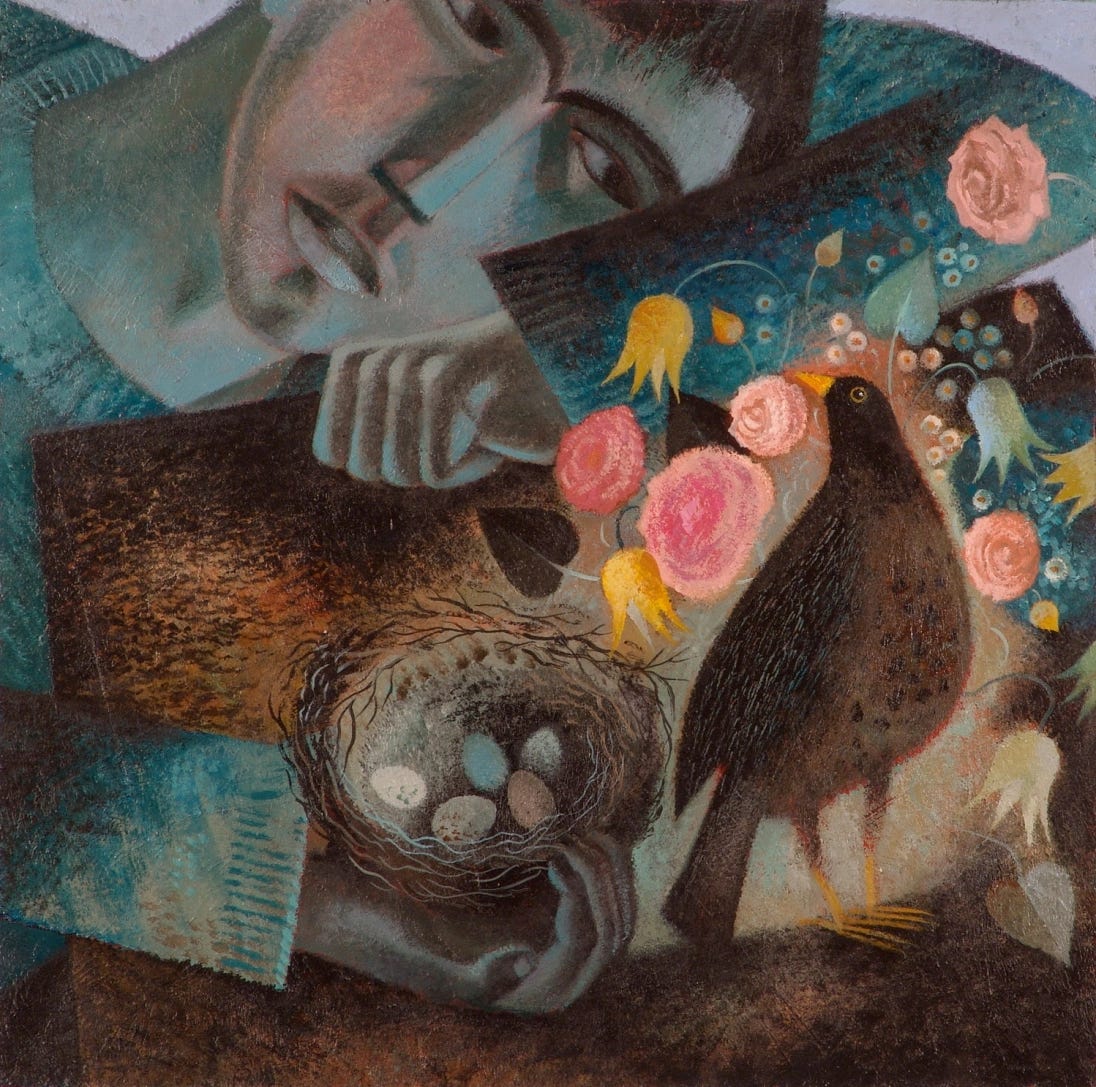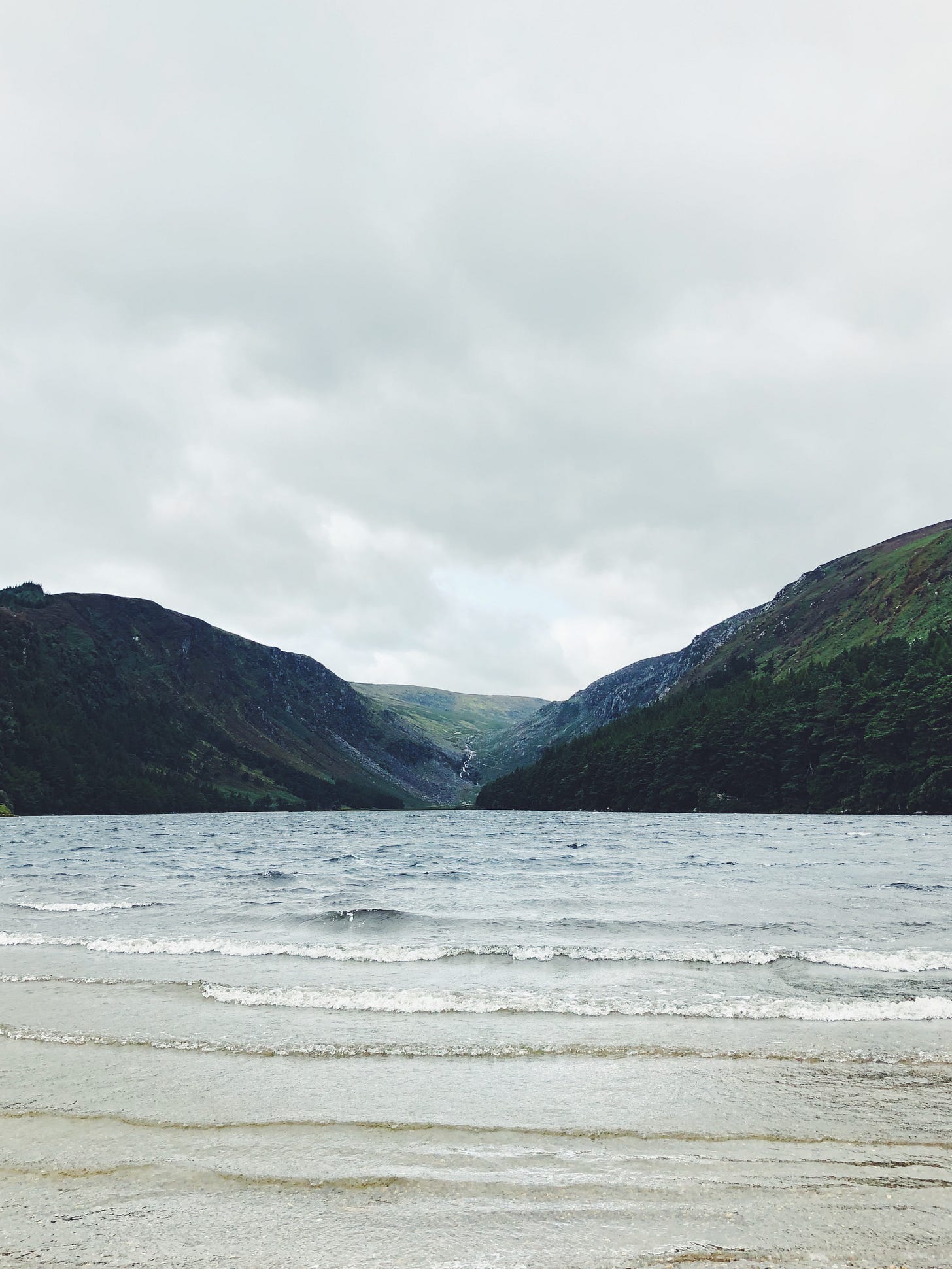I remember driving with my grandfather (my dad’s dad) in a blue chevy truck just after I’d gotten my license when I was a teenager. We rambled down the hill with the windows down. The bright summer sun shone through the dirty windshield, the wooded hills lush with summer foliage. It smelled like manure and freshly mown grass. The air was still. I myself might have been rambling about something. He didn’t say much. When we reached the bottom of the hill to turn onto the state highway, as I held my foot on the brake, the truck idling, he calmly said, “I don’t know why people get so impatient at intersections. What are they waiting for, sixty seconds at most?”
He had a sort of Downeast accent, so read that again v e r y , s l o w l y.
“I d o n ’ t k n o w w h y p e o p l e g e t s o i m p a t i e n t a t i n t e r s e c t i o n s …. ”
I think about this every day, every time I drive. Maybe he felt the truck jolt ever so slightly forward. Maybe he sensed me agitated, eager, anxious to find my opening. It was his way of giving advice, framing it as an observation of others. And it was a warning, don’t fall into the trap of racing around everywhere. But also, don’t misconstrue time. I think he was saying that sixty seconds is such a short amount of time to wait, but I also took it, or take it now, as to not waste even sixty seconds being impatient when you cannot control when your chance comes. What a gift.
I’ve always considered myself a patient person. I’ve espoused it as one of my values with which I show up in the world. I believe it’s true, I am patient, generally, often. But I’m also easily agitated, anxious at times, angry when overwhelmed, and sometimes very much not patient at all.
About three years ago, I experienced what I hope was peek impatience, or, a steady state of some of my weakest most vulnerable moments. The retail business my wife and I run together was crawling on all fours out of the pandemic bog. Meanwhile, we were years into a very long journey to start a family. I was stressed. I felt no sense of control and was driving all over the city each day delivering products to our customers.
One day, I was the first car at an intersection to turn right onto Memorial Drive in Cambridge. As I sat there idling, the white “No Turn on Red” sign gently gleamed in the pale winter sun. Behind it, a leafless sycamore stood tall, its branches swaying in the cold breeze. Beyond that, a bridge arched over the Charles River.
HONK!!!
Fury filled my veins as I looked in my rearview mirror at the person in the car behind me waving their hands for me to GO, GO, GO! I rolled down my window, looked them in the eye, and yelled, nice and slowly, “I w i l l t e a c h y o u f u c k i n g p a t i e n c e !” and I put my car in park until the light turned green and then crept forward, seething.
In that moment I was, of course, very much not patient at all.
Kevin of Glendalough who lived during the sixth century was the founder and first abbot of the famous monastery in County Wicklow, Ireland. Now Glendalough, Irish for “Valley of Two Lakes” is a highly touristed site ninety minutes from Dublin, but it’s easy when walking around to imagine what it felt like centuries ago, serene, wild, mythic. It is a place not unlike the valley in Umbria where St Francis communed with the wild that I wrote about in my last post.
It’s a place that feels both lush and desolate. The slopes of the deep green wooded valley rise up and away from either side of the grey lakes to the top of the surrounding craggy hills. It’s damp and windblown but also lush, quiet, and peaceful.
Kevin is said to have lived in a cave overlooking one of the lakes for a period of time, only wearing animal skins for clothing, only the wilderness and its creatures his companions. One of the most famous legends of Kevin involves a blackbird, which Seaumus Heaney captured in his poem, St Kevin and the Blackbird.
And then there was St Kevin and the blackbird.
The saint is kneeling, arms stretched out, inside
His cell, but the cell is narrow, so
One turned-up palm is out the window, stiff
As a crossbeam, when a blackbird lands
And lays in it and settles down to nest.
Kevin feels the warm eggs, the small breast, the tucked
Neat head and claws and, finding himself linked
Into the network of eternal life,
Is moved to pity: now he must hold his hand
Like a branch out in the sun and rain for weeks
Until the young are hatched and fledged and flown.
*
And since the whole thing's imagined anyhow,
Imagine being Kevin. Which is he?
Self-forgetful or in agony all the time
From the neck on out down through his hurting forearms?
Are his fingers sleeping? Does he still feel his knees?
Or has the shut-eyed blank of underearth
Crept up through him? Is there distance in his head?
Alone and mirrored clear in love's deep river,
'To labour and not to seek reward,' he prays,
A prayer his body makes entirely
For he has forgotten self, forgotten bird
And on the riverbank forgotten the river's name.
I found this poem while flipping through one of Heaney’s collections five years after visiting Glendalough and after seven heartbreaking years of trying to start a family.
And since the whole thing’s a metaphor anyway, I didn’t have to imagine. I knew that self-forgetfulness, I knew that agony. The answer is both, constantly oscillating between the two, month to month, minute to minute. Infertility is a unique kind of sorrow. One of longing and purpose and hope. One that requires both self-forgetfulness and the ability to live with agony in the body daily.
On the summer solstice last year, when driving home with our daughter for the first time, I felt such a fierce protective aching love for her I knew the years of self-forgetfulness and agony were worth it and that I would do it all over again to keep her healthy, happy, and safe. I drove the slowest I ever have that day, hyper-aware but unaffected by other drivers, as she sat cradled in the carseat.
Sometime that summer, I discovered the work of Clive Hicks-Jenkins, a Welsh artist who painted a series inspired by Heaney’s poem and the legend of St Kevin and the Blackbird. He perfectly captured the mood the poem elicits for me, presence, tenderness, contemplation, patience.
Writing is an act of patience. Art is an act of patience. Finishing something and doing it well takes patience. Every time I’ve ever felt eager and anxious to move on to the next phase of a project, the work suffers and my artistic clear-sightedness fades. As Heaney says, or Kevin said, “To labour and not to seek reward.” That is where the best art comes from, right?
Presence requires patience and some of the most meaningful things in life, such as the making art or parenting, require us to be fully present.
Needing to get some focused work done one day last week, needing to eat lunch, and also needing to move my body, I walked to Harvard Square from Porter Square thinking I’d find a quiet place to work and eat. The sky was clear and the air had a gentle bite to it, a nibble. It was a beautiful walk, but I waited too long to eat and got anxious and overwhelmed by my choices so I ended up getting a cup of strawberry ice cream and eating it in peace as I leaned against the wrought iron railing of the Old Burying Ground. It’s one of my favorite places in Cambridge to pause. A hallowed green space in the midst of modernity. It was the reset I needed.
And it was this mundane experience one afternoon that helped me understand that patience isn’t just a game of how long you can wait. That’s something else. At some point, you must act, decide, take your chance. Patience is being prepared without agitation. It’s laboring without seeking reward. But eventually, the project must be finished, lunch must be had, the turn at the intersection must be made. The newsletter must be sent.
-Caleb






I love this piece, Caleb, and of hearing of your pilgrimage to Glendalough, and of being reminded of Kevin's patience... Thank you.
I’m sitting here with a sleeping 17-year-old cat on my lap savoring your exquisite words… thank you, Caleb. I feel your grandfather (my dad) with a smile in my heart. Art, love, understanding all take patience.
What a quiet gift you give us all with your wise vulnerability💫